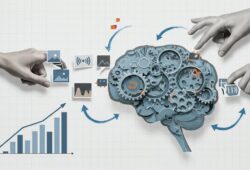In a world increasingly shaped by technology, businesses are witnessing a transformative shift in the way they manage customer relations. Customer Relationship Management (CRM) systems have emerged as a critical tool for companies of all sizes, driving significant improvements in revenue, return on investment (ROI), and customer relationship management.
Understanding CRM
CRM, short for Customer Relationship Management, is software designed to help companies manage their customer relationships efficiently. It empowers businesses to collect and store data related to their customers, including contact details, purchase history, and interactions with the company. This data can be leveraged to enhance communication, customer service, boost sales, and foster customer loyalty.
The choice of the best CRM for a company depends on its specific needs and budget. There are numerous CRM solutions available in the market, ranging from simple and cost-effective options to complex and sophisticated systems.
Key CRM Applications
CRM systems serve various purposes, including:
- Contact Management: CRM enables businesses to store and organize customer, prospect, and partner contact information. This aids in maintaining communication and tracking interactions.
- Opportunity Tracking: CRM helps in monitoring sales opportunities and potential customers, enabling companies to identify and prioritize promising prospects.
- Customer Management: CRM allows businesses to keep track of customer interactions, such as calls, emails, and meetings. This enhances customer service and fosters stronger customer relationships.
- Marketing: CRM can collect data on customer interactions, such as visited websites, purchased products, and opened emails. This data is then utilized to create more effective marketing campaigns.
Leading CRM Solutions in the Market
- Salesforce: Salesforce is one of the most popular CRM solutions globally, offering a comprehensive range of features.
- HubSpot CRM: HubSpot CRM is a free CRM solution that provides basic functionalities tailored to small businesses.
- Zoho CRM: Zoho CRM offers a comprehensive CRM solution with a wide range of features at an affordable price.
- Pipedrive: Pipedrive is a sales-focused CRM solution, ideal for tracking sales opportunities.
- Microsoft Dynamics 365: Microsoft Dynamics 365 is a complete CRM solution that integrates with other Microsoft products like Office and Azure.
- DataCRM: DataCRM is a user-friendly tool designed for simplicity yet with a high impact on sales. It has not only scaled Colombian companies but also those in all Latin American countries.
When selecting a CRM, it’s essential to consider your company’s specific requirements. Factors such as your company’s size, budget, and required features should guide your choice.
Benefits of Using a CRM
The advantages of implementing a CRM system are abundant, including:
- Enhanced Communication and Customer Service: CRM assists companies in maintaining contact with customers, tracking their interactions, and offering personalized customer service.
- Increased Sales: CRM helps identify and prioritize sales opportunities, automates sales tasks, and equips sales representatives with relevant information.
- Improved Customer Loyalty: A better understanding of customer needs and preferences enables companies to provide personalized experiences, fostering stronger customer loyalty.
- Cost Reduction: Automation of tasks, improved efficiency, and reduced data duplication lead to cost savings.
- Informed Decision-Making: CRM systems collect and analyze customer data, allowing companies to make data-driven decisions.
Artificial Intelligence Integration in CRM
The integration of Artificial Intelligence (AI) is revolutionizing CRM systems. AI is being employed to automate tasks, enhance decision-making, and create more personalized customer experiences.
Artificial Intelligence Applications in CRM
- Task Automation: AI automates routine tasks like tracking sales opportunities, sending follow-up emails, and resolving customer issues, freeing up employees for more strategic tasks.
- Enhanced Decision-Making: AI analyzes customer data to identify trends and patterns, enabling businesses to make informed decisions regarding products, services, and marketing strategies.
- Personalized Experiences: AI tailors customer interactions based on individual needs, strengthening customer relationships.
Examples of Artificial Intelligence in CRM
- Chatbots: AI-powered chatbots respond to customer inquiries and provide support.
- Recommendations: AI suggests products and services based on customer interests and purchase history.
- Predictions: AI forecasts customer behavior, such as potential purchases.
AI holds the potential to transform CRM, helping companies enhance customer relationships, boost sales, and improve overall performance. As technology continues to advance, AI-driven CRM systems will play an increasingly vital role in the business landscape.










